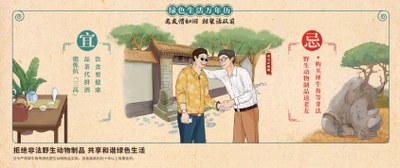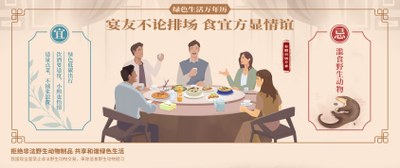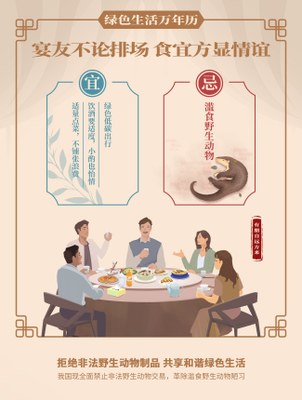Wildlife Free Gifting
The campaign used “The lunar calendar of green healthy living” to easily draw people’s attention. It featured five different scenarios in daily life; each scenario presented gifting with one of the four focal species as wrong behaviors. There were five scenarios, with ivory featured in two of them -- one as a gift for female elders during the family reunion and the other as a souvenir when travelling abroad. The scenarios portrayed typical social interactions and occasions which resonate with the target audiences.
Considering the attention to the issue of wild meat consumption due to the COVID-19 outbreak, the campaign started with Phase 1 focused on pangolin parts/products, which was expanded to cover all kinds of wild meat. The campaign focused on legal regulations, social norms, and risks to public and personal health/safety to explain why offering wildlife parts/products as food is wrong. At the same time, the campaign introduced and encouraged the right behaviors that can achieve “green healthy living”.
Phase 1: Wild Meat campaign (Pangolin chapter) launched in June 2020; and, Phase II: Tiger, Rhino Horn, and Elephant Ivory, launched in August 2020.
Following the campaign implementation, USAID Wildlife Asia conducted a joint monitoring survey on the Wildlife Free Gifting and Wildlife Protection Law campaigns. The intention to purchase products in the future among those exposed to any campaign decreased significantly from 2018 to 2021 for all four species - elephant (77% to 42%), rhino (74% to 27%), pangolin (65% to 23%) and tiger (74% to 38%). The decrease in intention to purchase in the future was even lower in Guangzhou, the focus area of the campaigns. Decreases were also found regarding the social acceptability of buying wildlife products and purchases in the previous 12 months among those exposed to the campaigns.
Based on these results, USAID Reducing Demand for Wildlife (RDW) continued the Wildlife Free Gifting campaign with two dissemination rounds between January and May 2022. The 2021 China Rapid Monitoring Survey results also guided RDW to expand the campaign's geographic focus to other areas -- Shenzhen, Nanning, and Kunming -- where there are a significant number of current and potential consumers. In addition, a digital component was incorporated to target potential wildlife product buyers/gifters based on their online search behaviors and socio-demographic characters. The campaign reached more than 3.4 million people and 95 percent of survey respondents said they had no intention of buying or gifting wildlife products in the future.
Wildlife Free Gifting Campaign Key Visuals





Wildlife Free Gifting Campaign Video PSAs
Five 30-second animated videos: All videos begin with an opening scene showing a book called "The Lunar calendar of green healthy living" and end with the Call to Action -“Say No to illegal wildlife products, Embrace the harmonious life with a healthy lifestyle”. The five videos are in animation and use typical life scenarios to show different occasions and social interactions/relationships.
Wildlife Free Gifting Campaign-Pangolin: Do not treat old friends ostentatiously with too much and inappropriate food and wine. You can show how much you cherish your lasting friendship only with a healthy and happy reunion.
Wildlife Free Gifting Campaign-Ivory Souvenir: Be well behaved when you travel and always understand the limits of what you can do during your trip. Do not purchase or carry illegal wildlife products such as ivory souvenirs.
Wildlife Free Gifting Campaign-Ivory Bangle: It’s nice to always be by your loved one’s side and show your love by celebrating anniversaries in a proper way. Do not gift with illegal wildlife products such as ivory products to your loved ones.
Wildlife Free Gifting Campaign-Tiger Bone: It is always warm and pleasant to be with family. Please take eco-friendly actions during family gatherings. Do not gift with illegal wildlife products such as tiger bone wine to elders in the family.
Wildlife Free Gifting Campaign-Rhino: Do not let ostentatious displays and meaningless competition ruin sincere and long-lasting friendships. Do not gift friends with illegal wildlife products such as rhino horn products.






